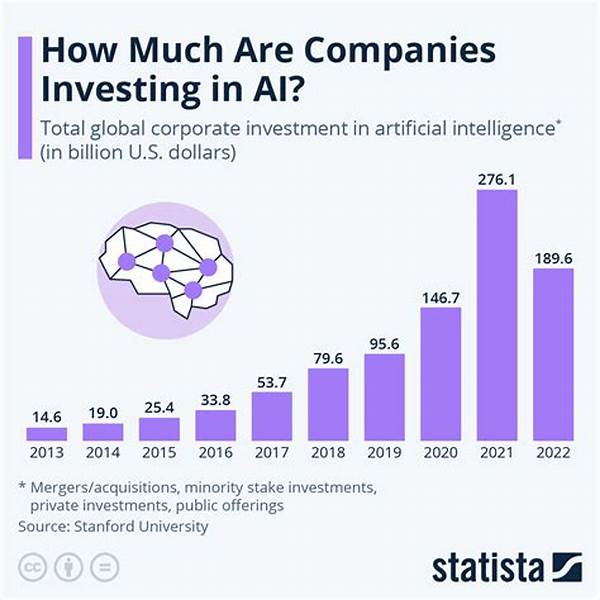Why Big Tech Companies Invest Heavily in AI
In a world characterized by rapid technological advancements, artificial intelligence (AI) stands out as a pivotal development shaping the future. You might wonder why big tech companies invest heavily in AI, and the answer lies in the fundamental transformations AI brings across industries. With AI, tech giants like Google, Apple, Amazon, and Microsoft are not just riding the wave of a trend; they are embedding AI as a core component of their strategic vision. Imagine a world where machines understand human language, self-drive cars are an everyday affair, and personalized recommendations know you better than your best friend. That’s the world of AI—a world filled with promise and potential, propelling tech titans to invest billions of dollars in its research and development.
Read More : How Ai Impacts The Finance Industry
The motivations behind these investments are multifaceted. Big tech companies aim to maintain innovation leadership, optimize operational efficiencies, and unlock new revenue streams. But beyond the bottom line, these companies are driven by an insatiable curiosity and a desire to solve complex problems. For a company like Google, AI enables better understanding and processing of search data, improving user experience and providing more relevant results. Amazon, with its sophisticated AI models, can better predict consumer behavior, streamline supply chains, and enhance its recommendation systems. These examples show that AI isn’t just a tool; it’s a game-changer with profound implications.
Yet, the question remains: why big tech companies invest heavily in AI? It boils down to staying competitive. In the fast-paced digital economy, standing still is equivalent to falling behind. AI provides the technological edge that allows these giants to innovate at scale, create disruptive products, and capture market share. As we delve deeper into the topic, we will explore the implications and benefits of AI in tech, diving into the creative, rational, and emotional facets of this technological revolution. This journey will reveal not just the economic reasons behind these investments but also the visionary approaches of tech leaders who believe in a future powered by AI.
The Economic Impacts of AI Investments
AI investments are driving significant economic benefits for these companies. The automation of complex processes leads to reduced costs and increased efficiency. For instance, AI-powered chatbots handle customer inquiries at a fraction of the cost of human customer service representatives, providing round-the-clock assistance. This efficiency not only cuts down on expenses but also significantly enhances the customer experience, making interactions seamless and prompt.
Innovation and Market Leadership
AI enables companies to lead in innovation, setting trends rather than following them. By integrating AI, these companies have birthed technologies that were once the stuff of science fiction—think facial recognition and language processing. These innovations keep companies at the forefront, maintaining their status as pioneers in the tech industry and ensuring they are not overtaken by competitor advancements.
—
Structure of AI Investments in Big Tech
Investments in AI are complex undertakings needing a well-defined approach. Understanding the structure of why big tech companies invest heavily in AI involves looking at several key areas: research and development, talent acquisition, strategic partnerships, data acquisition, and ethical considerations.
The first pillar is research and development (R&D). Tech companies set aside substantial R&D budgets to explore AI’s vast possibilities. This allocation supports both basic and applied research, from developing new AI algorithms to creating applications that solve real-world problems. The ability to innovate rapidly and stay ahead in AI technology is crucial to these companies, setting the foundation for future success.
Another significant factor is talent acquisition. Companies are in a race to hire top-tier AI experts, data scientists, and engineers who can push the boundaries of what’s possible. With fierce competition, tech giants offer lucrative compensation packages to attract and retain the brightest minds. This focus on human capital underscores the strategic importance of AI to these organizations.
Strategic Partnerships and Collaborations
Collaboration is another method through which companies bolster their AI capabilities. By partnering with universities, research institutions, and even startups, tech companies can leverage external expertise and innovation. These partnerships are mutually beneficial, as they often combine the industry expertise of tech giants with cutting-edge academic research.
Data as a Catalyst for AI
Data is the lifeblood of AI, and tech companies invest heavily in data acquisition and management. The companies’ substantial data repositories allow them to train more accurate and reliable AI models. The emphasis on data underscores its critical role in enabling AI technologies to learn, adapt, and evolve.
Ethical considerations are increasingly important in the realm of AI. Companies allocate resources to ensure their AI technologies adhere to ethical guidelines and practices. By promoting transparency, fairness, and accountability, they strive to build trust in their AI systems, addressing public and regulatory concerns.
—
Related Topics on AI Investments
—
Exploring Big Tech’s AI Investment Strategies
The strategies behind why big tech companies invest heavily in AI are as diverse as they are strategic. These investments go beyond mere financial gains—they are about building a future where technology seamlessly integrates into everyday life, enhancing it in numerous ways. With AI, the customer experience is no longer just about satisfaction but anticipation of needs before they arise.
By 2025, AI is expected to contribute over $15 trillion to the global economy, a testament to its transformative potential. Big tech’s leadership in this arena positions them to capture a significant share of the economic benefits that AI brings. Their focus is not only on consuming AI but also on shaping its progression. They influence everything from regulatory policies to global standards in technology.
Dynamic innovations in AI drive new product categories—from voice-activated assistants and autonomous vehicles to advanced analytics tools. This relentless pursuit of innovation ensures they remain at the forefront of technology leadership. AI is not just about maintaining market share; it’s about defining the future technological landscape.
To fully grasp why big tech companies invest heavily in AI, one must look at the broader picture of technological evolution. AI embodies the next step in this evolution, promising unprecedented opportunities and challenges. The tech giants’ heavy investments manifest their belief in AI’s ability to redefine our world, a belief that continues to fuel their pioneering ventures into uncharted technological territories.
—
By examining these facets, you gain insights into the intrinsic motivations and strategic practices behind tech companies’ relentless pursuit of AI excellence.


